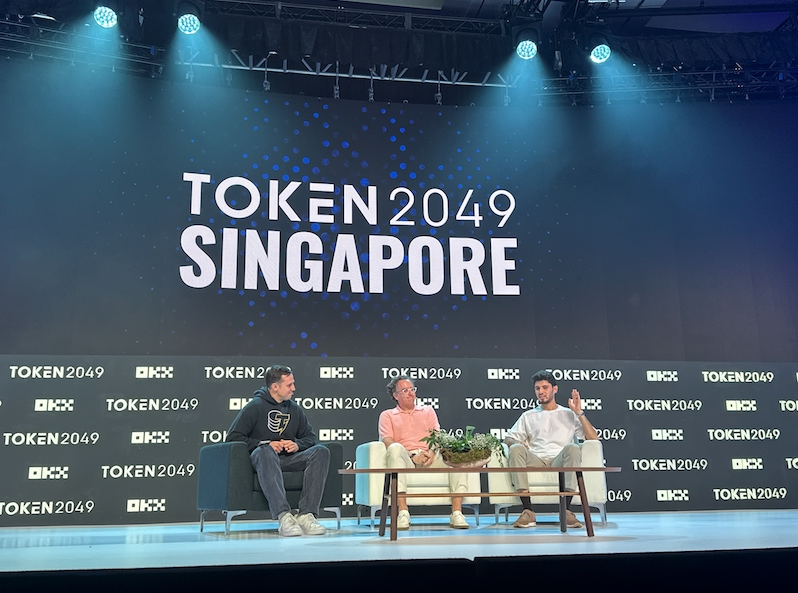A ruble-backed stablecoin tied to a sanctioned Russian bank has made headlines after appearing as a Token2049 sponsor, raising major questions about regulatory oversight and compliance with international sanctions.
The coin, issued by A7A5 and backed by Promsvyazbank (PSB) as a Russian state-owned bank blacklisted by the United States, the United Kingdom, and Singapore was prominently featured during this year’s Token2049 conference in Singapore, one of Asia’s largest crypto gatherings.
According to reports, A7A5 managed to secure sponsorship status for the event despite PSB being under heavy sanctions related to its role in financing Russia’s defense operations following the invasion of Ukraine. Singapore’s Monetary Authority of Singapore (MAS) imposed financial restrictions on PSB in 2023, banning local institutions from engaging with the bank or its affiliates.
Yet, because Token2049 is organized by BOB Group, a Hong Kong-based entity operating under a different regulatory system, the Token2049 sponsor deal slipped through jurisdictional cracks.
Allowing a sanctioned-linked company to appear as a Token2049 sponsor not only undermines the credibility of the event but also sends the wrong message about compliance culture in crypto, said Maria Tan, a financial sanctions expert at the Asia Compliance Forum.
How a sanctioned entity became a Token2049 sponsor
The controversy began when attendees noticed A7A5’s logo among the list of Token2049 sponsors on the event’s official website. Given A7A5’s connection to PSB, which has been sanctioned by multiple Western nations, many were alarmed by the oversight.
Event organizers later clarified that Token2049’s sponsorship operations are managed from Hong Kong, where regulators have taken a more flexible stance toward Russian entities. While Singapore’s MAS enforces strict sanctions, Hong Kong has chosen not to impose equivalent restrictions, creating a loophole that A7A5 reportedly exploited to gain exposure at the event.
In March 2023, MAS explicitly prohibited financial institutions in Singapore from engaging with PSB or its subsidiaries. Despite this, A7A5, which holds its reserves with PSB, was able to participate as a Token2049 sponsor, prompting criticism from compliance officers and other event participants.
It’s a compliance nightmare, said an unnamed executive at a major blockchain infrastructure company that co-sponsored the event. Even if the Token2049 sponsor agreement technically falls under Hong Kong jurisdiction, the optics are terrible for anyone trying to uphold international standards.
Following backlash, the Token2049 organizers quietly removed A7A5’s branding from the sponsor list. However, A7A5 continued to promote its participation on social media platforms, even claiming credit for sponsoring the event’s “massage lounge” which is a gesture that further fueled outrage.
Crypto’s clash with international sanctions
The Token2049 sponsor dispute underscores the growing tension between the borderless nature of cryptocurrency and the territorial scope of international sanctions. The crypto sector, often lauded for decentralization and global access, faces mounting pressure to address compliance gaps that can be exploited by sanctioned entities.
This incident demonstrates why clearer cross-border sanctions enforcement is critical, said Dr. Aaron Lim, a senior fellow at the Institute for Global Finance Policy. If one jurisdiction enforces sanctions while another ignores them, bad actors can easily route around the system. The Token2049 sponsor case is a textbook example.
Global events like Token2049 play a pivotal role in shaping industry standards and fostering dialogue among investors, developers, and policymakers. But the inclusion of entities like A7A5, linked to sanctioned banks, risks damaging trust in these platforms.
For participants from the U.S. and U.K., where engaging with sanctioned organizations is a criminal offense, mere association with a Token2049 sponsor like A7A5 could carry reputational and legal risks.
The need for unified regulation across jurisdictions
As the crypto industry expands, the Token2049 sponsor controversy reveals an urgent need for a more harmonized international framework to govern sponsorships, partnerships, and event participation. Jurisdictional inconsistencies like those between Singapore’s MAS and Hong Kong’s Securities and Futures Commission (SFC) create regulatory blind spots that sanctioned actors can exploit.
The A7A5 episode has also reignited debate over whether global crypto events should establish an independent compliance body to vet potential sponsors and exhibitors. Such a mechanism could prevent future cases where sanctioned entities appear at high-profile conferences, inadvertently legitimizing them.
With crypto going mainstream, it’s no longer acceptable to plead ignorance on sanctions, — Elaine Zhou, Chief Compliance Officer at ChainReg Analytics, told Decrypt.
Organizers must ensure every Token2049 sponsor or exhibitor complies with international laws, regardless of where the event is hosted.
Looking ahead, the fallout from this controversy may push more event organizers to adopt unified due diligence protocols. As global regulators tighten sanctions enforcement, maintaining transparency and compliance will be essential for safeguarding the reputation of leading crypto events.

Leave a Reply